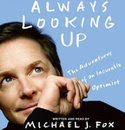Dec 8, 2011
Religion, Philosophy, and Nature
Nov 29, 2011
Fact of Global Warming
Apr 27, 2011
Learning and the Brain
Mar 22, 2011
Learning Technologies
Mar 2, 2011
Education Theories Continued
Positive Inspiration
Positive inspiration can be found in those we encounter. It can be found in their eyes, heard in their stories, and seen in their faces. Michael J. Fox is one such person that inspires countless people. The following peek into his book and life is just a fragment of inspiration that this man exudes.

At the turn from our bedroom into the hallway, there is an old full-length mirror in a wooden frame. I can't help but catch a glimpse of myself as I pass. Turning fully toward the glass, I consider what I see. This reflected version of myself, wet, shaking, rumpled, pinched and slightly stooped, would be alarming we...re it not for the self-satisfied expression pasted across my face. I would ask the obvious question, "What are you smiling about?" but I already know the answer: "It just gets better from here." - Michael J. Fox (from his book Always Looking Up)
"Education's purpose is to replace an empty mind with an open one." - Malcolm Forbes